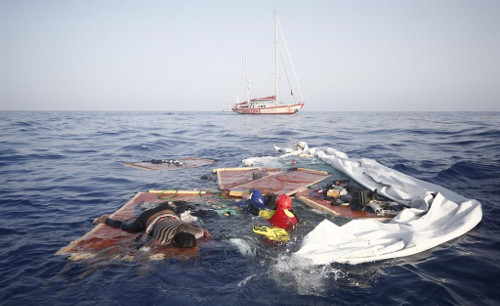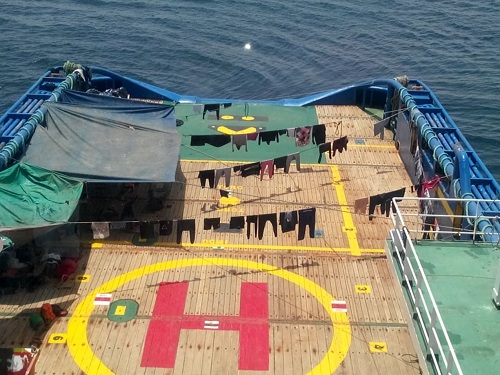Quellenangabe:
Developments in the Central Mediterranean Sea, June/July 2018 (vom 27.07.2018),
URL: http://no-racism.net/article/5411/,
besucht am 07.12.2025
[27. Jul 2018]
Developments in the Central Mediterranean Sea, June/July 2018
The conflict over Mediterranean migration has further escalated over the past six weeks. The closure of Italian harbours to the rescued at sea, the criminalisation of non-governmental rescuers, and the support granted to Libyan authorities by European institutions and member states has further deteriorated the situation for those seeking to cross the Mediterranean from Libya.
The result has been devastating. In the month of June alone, about 564 people are acknowledged as having died in the Central Mediterranean, although only 3,100 people reached Europe via this route from Libya. Last year, in June 2017, the figure of arrivals stood at 23,500. That the situation has further worsened is not due to fate but due to a calculated letting-die policy enacted by European nation-states and institutions. A significant dimension of such policy is the criminalisation and the pushing out of non-governmental rescuers and witnesses, which in particular the Italian government, but also the ones in Germany and Austria have forcefully pursued. Through the absurd stand-off with the Aquarius vessel carrying more than 600 precarious travellers in mid-June, the Italian government not merely endangered their lives and well-being, but acted on its cynical promise to prevent disembarkations in Italy, no matter the costs. And the costs are great.
In mid-June, a US Navy vessel conducted a rescue operation, rescued 41 people and recovered 12 corpses. Initially prevented from disembarking in Italy, they threw the 12 bodies back into the sea. Near the scene, the crew of the NGO vessel Sea-Watch 3 discovered a deflated rubber dinghy, without any passengers in sight. What happened to them remains unclear. On the 19th of June, after an Italian vessel seemingly refused to rescue passengers on a boat in distress, five people – three women and two boys – fell into the sea and drowned.1 The Italian refusal to let rescuers dock in Italian harbours severely obstructed the vital work of the SAR NGOs. Shortly after the Aquarius was banned from Italian harbours, the Italian government also denied the NGO vessels Lifeline and Seefuchs entry to its ports.2 The Lifeline, after saving 234 people near Libya, was initially refused entry also to Malta, and could dock only days later. Upon landing, the rescue vessel was impounded and its captain, Claus-Peter Reisch, arrested, who later stated: “Our mission was to save 234 people. I am not aware of having committed any crime.”3In the days that followed the 20th of June, the World Refugee Day, during which several NGO vessels were unable to continue with their work, an estimated 220 people died over three days at sea. The denial of responsibility by European coastguards was experienced also directly by the Alarm Phone, when on the 23rd of June a boat with 96 people on board was in severe distress at sea, as the travellers confirmed to us. The Italian authorities informed us that the Maltese authorities would coordinate their rescue, while the coordination centre in Malta seemed unaware about the case and later suggested that the Libyan ‘coastguards’ would take on the case. Unwilling to accept this situation, a ‘mail bombing’ action targeting the Italian Coastguards on the 24th of June was launched, in which the Alarm Phone participated, demanding the immediate resumption of rescue operations and their coordination.4
A few days later, at the EU summit in late June, European institutions and member states agreed on closed camps for those rescued at sea, containment camps in North Africa, a greater mandate for the EU border agency Frontex, the increased ‘protection’ of EU external borders and more money for authoritarian regimes to deter or contain travellers at Europe’s behest. On the same day, the 29th of June, a shipwreck occurred off Libya, with about 100 fatalities.5 In early July, the situation took another turn for the worse, with SAR NGOs being prevented by the Italian authorities from conducting rescue operations, either by being ordered to not interfere with the Libyan ‘coastguards’’ abductions of people back to Libya, or by being hindered from leaving European ports in the first place and being dragged in front of courts.6 On the 1st of July, another shipwreck occurred off Libya, with about 114 fatalities. That first July weekend, 218 people lost their lives at sea. When the NGOs were still conducting rescues, European military actors and the border agency Frontex kept a low profile. They let the NGOs lift the heavy burden, though routinely portraying transfers of people rescued by the NGOs as ‘their’ rescues. Without the NGOs, these actors are now occasionally conscripted by the Italian Maritime Rescue Coordination Centre to conduct rescues, as was the case in mid-July, when Frontex was involved in the rescue of 450 people at sea. With some of the rescued on board, Frontex then faced the situation that the NGOs have faced for weeks, they were unable to disembark them in Italy. This bizarre situation only came to an end when five EU member states accepted to take 50 of the rescued migrants each. After disembarkation, survivors reported that they had witnessed four people drown at sea.7 Also the European military anti-smuggling operation Eunavfor Med faced a predicament a few days later, with Italy declaring their harbours closed also to them, though an agreement has been found since that allows, for the time being, for the continuation of the mission and the disembarkation in Italian harbours.8

This year, thousands of people trying to escape Libya were intercepted by the Libyan ‘coastguards’ as desired by Europe. These authorities added one more atrocity to their long list of abuse and neglect when the NGO Proactiva Open Arms discovered two dead bodies and one survivor in a completely destroyed rubber boat off the coast of Libya. The Libyan ‘coastguards’ had “rescued” the people, so they said. Proactiva, however, found a woman clinging to the debris. Following Proactiva’s account, the three had refused to return to Libya and were left behind to die. Their refusal to be returned is not surprising when we pay attention to what occurs to those who are abducted back to Libya. The situation there is devastating but many seem to have become used to stories of torture and rape, incarceration and extortion. On the 16th of July, eight migrants, including six children, were found dead after suffocating in a truck container in Zuwarah/Libya. There were about 100 people in total, and those who survived were brought to a hospital for treatment.9
Although the Alarm Phone received most distress cases from the other Mediterranean regions over the last six weeks, we were alerted to a boat in distress on Saturday the 14th of July, carrying 40 people from Africa, which had left from Libya. They were rescued by the supply vessel Sarost 5 in international waters and in the Maltese Search and Rescue zone.10 Malta, however, refused to find a safe harbour for them, and Italy and Malta both denied disembarkation. The supply vessel then took course on Sfax/Tunisia, to disembark the people. The authorities there, however, refused to allow them to land as well. They were told to land in Zarzis/Tunisia. But also there they were blocked from entering the port and so, at the time of writing, they are still stranded on a boat in the Mediterranean, now for over 14 days. We have released several testimonies from the people on board, have condemned this policy of neglect in a press statement and have also instigated a mail bombing campaign to prompt the Maltese authorities to take on their legally mandated responsibility to coordinate a safe harbour for the distressed.11

Notes
1 :: guardian.ng
2 :: theguardian.com
3 :: dw.com
4 :: facebook.com/watchthemed.alarmphone
5 :: reuters.com
6 :: theguardian.com
:: reuters.com
7 :: reuters.com
8 :: dw.com
9 :: aljazeera.com
10 :: maltatoday.com.mt
:: taz.de
:: adnkronos.com
:: rfi.fr
11 :: alarmphone.org, 18. July 2018
:: alarmphone.org, 19. July 2018
:: facebook.com/watchthemed.alarmphone
:: adnkronos.com
:: timesofmalta.com
:: taz.de
Source From the Sea to the City! Alarm Phone 6 Week Report, 11 June – 22 July 2018, published on 27. July 2018 in :: alarmphone.org